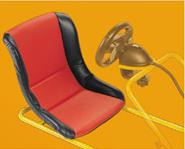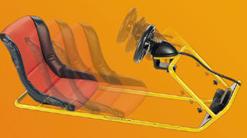Soap box racing takes a turn for the geeky.
2001 has been a good year for interesting new games, with doozies like Black
& White and Gran Turismo 3
reminding us what a little elbow grease can do for game design. But while the
software has been solid, the real innovation comes from the wacky world
of peripheral manufacturers, the mad scientists of the industry.
This is the story of one such company and their latest invention: an uber-dorky
PS2 go-kart without the wheels and engine.
Hyperdrive,
a company made up of a few blokes from the UK, has put together a practical
and resourceful contraption that would make MacGyver himself proud. For a slightly
inflated pricetag of $150, you can own this very contraption.
The Hyperdrive (yep, same name as the company) is an interactive driving
unit. It’s basically a metal frame that sits on the floor and functions like
a go-kart, packaged complete with a Playstation 2 racing wheel (Saitek’s Force
Feedback RX400), pedals and racing bucket seat. Most of what you need to
immerse yourself in the driving experience is here – minus a stick shift and
maniac drivers.
It’s big, super-geeky and way more comfortable than it looks.
The simple design allows for simple installation. In mere minutes we were ready
to take her for a test drive, thanks in part to the Hyperdrive‘s adjustability.
It may look like a child’s plaything, but this baby can actually be elongated
to fit adults easily. The steering wheel can also be raised for added comfort.
The Saitek PS2 Force Feedback RX400 racing wheel is a decent enough
driving peripheral. Like most standard PS2 racing wheels, the RX400 has
all the buttons you’ll find on a Playstation controller (no analog L3 & R3 buttons,
though). Acceleration and brake pedals correspond with the X and Square buttons,
which are usually the gas and brake in most PSX and PS2 driving games. But Twisted
Metal: Black, for instance, will have you using the left brake pedal
for gas and the right pedal for braking. It’s pretty confusing.
 Given,
Given,
this is due more to TMB‘s lack of customizable control configurations,
not the Hyperdrive. Still, it would have been nice for the Hyperdrive
to use button-agnostic pedals and allow you to program whatever you’d like.
Unfortunately, what we can attribute to the Hyperdrive is average
sensitivity and control (most notabley w/Gran
Turismo 3) – nothing exceptional here. But in truth, this is where wheel
maker Saitek dropped the ball. Here we have another wheel that only permits
the virtual driver 90 degrees rotation in either direction. Why haven’t these
concept designers and manufacturers realized that true precision from a wheel
peripheral can only come from an authentic turning radius? Without this, you’re
left having to attempt extremely minute steering maneuvers because the wheel
only turns 180 degrees.
But if it’s any consolation, the pedals are spaced apart comfortably and the
Hyperdrive unit has them resting at a slant, just like an automobile.
If it weren’t for the big, goofy Hyperdrive setup, the pedal unit would
have no support to keep it in place, which is a frustration that haunts most
pedal units. In this case, the problem has been solved.
Despite it’s somewhat awkward size, the Hyperdrive for the PS2 is a
very intriguing product. We loved the comfort and design of the unit itself,
but were a little disappointed in the choice of steering wheels. The limited
turning radius directly leads to touchy sensitivity and keeps the Hyperdrive
unit from shining as brightly as it should. But perhaps they’re on to something
here…

-
Comfortable
-
Cool & geeky
-
Practical...
-
...if you have the space
-
A bit over-priced
-
Poor choice of wheels











